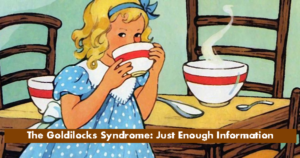 The saying goes, “Tell your readers everything they need to know and nothing they don’t need.” Simple enough: make it “juuust right,” like Baby Bear’s porridge. But how do you know how much is enough… or too much? I wish I could give an easy answer. If we take a look together at the possibilities, I bet you can come up with an answer on your own that fits your writing style.
The saying goes, “Tell your readers everything they need to know and nothing they don’t need.” Simple enough: make it “juuust right,” like Baby Bear’s porridge. But how do you know how much is enough… or too much? I wish I could give an easy answer. If we take a look together at the possibilities, I bet you can come up with an answer on your own that fits your writing style.
Too Hot!
First, there’s the danger of too much information. This could mean giving so much back story that the reader expects it to be significant—when it isn’t. It becomes a distraction from the things she needs to know in order to follow your plot forward. I have read a critically acclaimed (foreign) novel that had chapters and chapters of detailed back story of a minor character that ended up being a complete dead end; none of it mattered at all. Ugh. Tongue-scalding. Chekov was right when he said that if you describe a gun on the mantel, it had better shoot somebody—and this isn’t the same thing as dropping red herrings, which is deliberate.
Too-muchness can also be seen easily in dialog, where, in the name of realism, you might find yourself creating all sorts of small talk that just diffuses the meat of the exchange. (“Hi, George. How are you?” “Fine. How about you?” “I can’t complain…except that I’ve lost my job.” Now the real story starts emerging.)
It can exist in the form of purple prose—too much forced description, too many adjectives and adverbs with the same repetitive rhythm. From rich it can become fussy pretty quick. And it can be tempting to explain things or repeat them over and over, but your reader is actually pretty smart and will find that patronizing or at least boring.
It can occur when we spin a story out too far beyond the denouement, elucidating events too explicitly. My special pet peeve is the “epilogue” that carries the characters forward ten or twenty years in a brief summary. (“Joe ends up marrying Jane and they have five kids. And twenty years later, one of them becomes a vampire hunter like mom.”) If you want to follow them past the end of the plot, incorporate those years and those events into the plot as it exists. Or write another book. Poets will tell you this: you have to know when to stop.
Too Cold!
Then there’s the danger of not enough information, which can leave readers confused or uninvolved. Without any backstory, who can guess at the motives of characters? They float, ungrounded in their actions. What sort of people are they? Can you empathize with the villain without knowing his damaging childhood?
The lack of information is especially grave in thrillers or mysteries: there have to be clues dropped subtly along the way, or the final reveal comes across as deus ex machina. Details that seemed unimportant turn out not to be.
And no description at all produces a novel that is not much more engrossing than a textbook. Readers aren’t drawn into your world. There is admittedly a school of thought that urges us to leave things spare so the reader can “collaborate” with us by using her imagination. But this can become laziness pretty quick. Do you know what your world and your characters look/smell/sound like? It’s our duty as the author to give people’s imagination something to shape itself around: we want them to experience the world we’ve created, remember, not their own.
Juuust Right!
Somewhere in the middle lies the sweet spot, Goldilock’s perfect porridge. Your beta readers can help you find that point where they feel satisfied that they have all the information they need without being glutted. The exact degree of just-rightness will depend on your style and your readers’ expectations (for example, certain genres set a “colder” or a “hotter” spot of perfection). When you hit it, readers will go away full and happy… and come back for more!

Jack Courtney
Thanks for you excellent post Niki. My problem as an aspiring writer is that, in the novels I read, I’m looking at each event and estimating where the author is going with it. I know this is partly a consequence of my studying their style and technique as I read along. The upshot is that, if there is nothing extraneous (and no red herrings) in the story, I keep waiting for the previously mentioned items to drop into the story as the end approaches. Thanks again.
Niki Kantzios
You have a very particular style of reading, Jack! But it dramatizes how readers’ expectations must be satisfied without glutting them.
Anne Hawkinson
Thank you for helping writers find just the right temperature!
Niki Kantzios
You’re more than welcome!